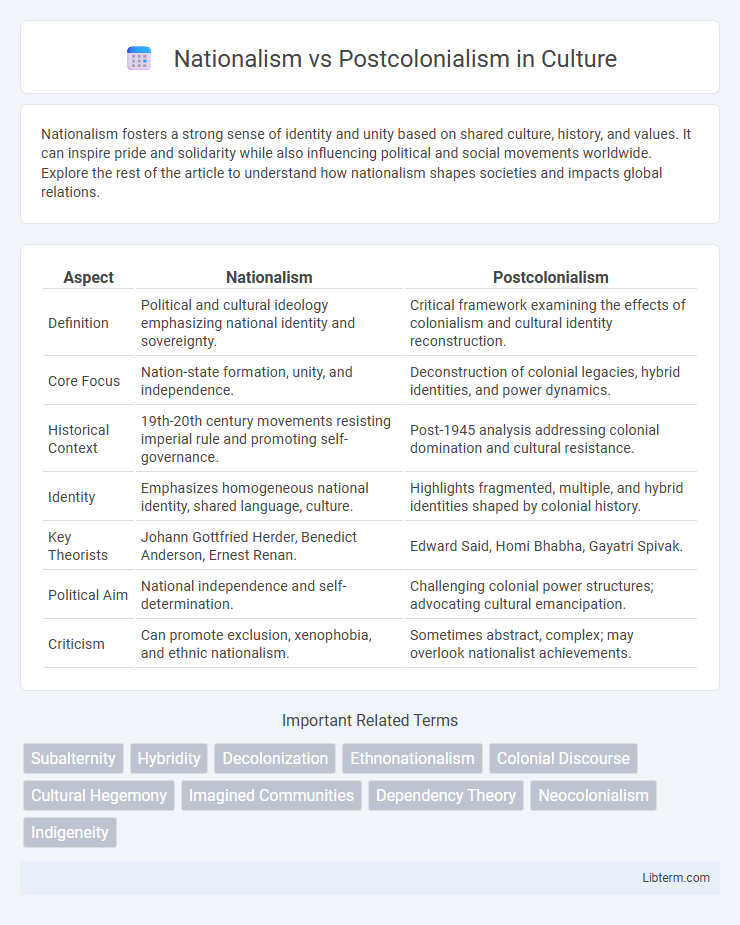Nationalism fosters a strong sense of identity and unity based on shared culture, history, and values. It can inspire pride and solidarity while also influencing political and social movements worldwide. Explore the rest of the article to understand how nationalism shapes societies and impacts global relations.
Table of Comparison
| Aspect | Nationalism | Postcolonialism |
|---|---|---|
| Definition | Political and cultural ideology emphasizing national identity and sovereignty. | Critical framework examining the effects of colonialism and cultural identity reconstruction. |
| Core Focus | Nation-state formation, unity, and independence. | Deconstruction of colonial legacies, hybrid identities, and power dynamics. |
| Historical Context | 19th-20th century movements resisting imperial rule and promoting self-governance. | Post-1945 analysis addressing colonial domination and cultural resistance. |
| Identity | Emphasizes homogeneous national identity, shared language, culture. | Highlights fragmented, multiple, and hybrid identities shaped by colonial history. |
| Key Theorists | Johann Gottfried Herder, Benedict Anderson, Ernest Renan. | Edward Said, Homi Bhabha, Gayatri Spivak. |
| Political Aim | National independence and self-determination. | Challenging colonial power structures; advocating cultural emancipation. |
| Criticism | Can promote exclusion, xenophobia, and ethnic nationalism. | Sometimes abstract, complex; may overlook nationalist achievements. |
Defining Nationalism: Concepts and Historical Roots
Nationalism centers on the belief in the distinct identity and sovereignty of a nation, often emphasizing shared culture, language, and history as core elements. Its historical roots trace back to the 18th and 19th centuries, particularly during the era of European state formation and anti-colonial resistance movements. Understanding nationalism requires exploring how these concepts influenced political mobilization and shaped modern nation-states in both Western and colonized contexts.
Understanding Postcolonialism: Origins and Evolution
Postcolonialism emerged as a critical framework addressing the cultural, political, and economic legacies of colonialism, challenging nationalist narratives rooted in colonial state boundaries and identities. It examines the power dynamics and identity reconstruction processes that nations undergo after gaining independence, emphasizing hybridity, resistance, and decolonization of knowledge. Originating in the mid-20th century through scholars like Frantz Fanon and Edward Said, postcolonialism evolved to critique imperialism's enduring impact on global relations and cultural representations.
Key Differences Between Nationalism and Postcolonialism
Nationalism centers on the formation and promotion of a unified national identity often rooted in shared culture, language, or ethnicity, aiming for political sovereignty and self-determination. Postcolonialism critically examines the legacy and cultural, political, and economic impacts of colonialism on formerly colonized societies, emphasizing issues of identity, power dynamics, and resistance against imperialist narratives. While nationalism prioritizes state-building and national unity, postcolonialism focuses on deconstructing colonial histories and addressing ongoing inequalities resulting from colonial domination.
The Role of Identity in Nationalist and Postcolonial Movements
Identity plays a central role in both nationalist and postcolonial movements by shaping collective consciousness and political agendas. Nationalism often constructs a unified national identity to mobilize people against perceived external threats, emphasizing cultural heritage and historical continuity. Postcolonial movements challenge colonial identities imposed by imperial powers, seeking to reclaim indigenous identities and address issues of hybridity, displacement, and cultural resistance.
Colonial Legacy: Shaping Modern Nationalism
Colonial legacy significantly shapes modern nationalism by embedding deep-rooted socio-political hierarchies and economic disparities within newly independent states. Postcolonial theory critiques nationalism for often perpetuating colonial power structures through exclusionary identity politics and centralized state control. This legacy challenges the formation of inclusive national identities, compelling nations to navigate between decolonization efforts and nationalist agendas influenced by colonial histories.
Postcolonial Perspectives on Nation-Building
Postcolonial perspectives on nation-building emphasize reclaiming indigenous identities and resisting colonial legacies that shaped arbitrary borders and governance structures. These viewpoints critique nationalist narratives imposed by colonial powers, advocating for inclusive frameworks that address historical injustices and cultural hybridity. Emphasizing decolonization, postcolonial theory foregrounds the complexities of identity, sovereignty, and development in formerly colonized nations.
Nationalism’s Impact on Postcolonial Societies
Nationalism in postcolonial societies often serves as a unifying force that fosters a collective identity and drives political independence from colonial powers. This ideological framework can also prioritize indigenous culture, language, and historical narratives, reshaping social and political institutions. However, nationalism sometimes leads to exclusionary practices and internal conflicts by emphasizing ethnic or cultural homogeneity over pluralism.
Cultural Representation: Narratives and Counter-Narratives
Nationalism often emphasizes a unified cultural identity through dominant narratives that reinforce state or ethnic pride, frequently marginalizing minority voices. Postcolonialism challenges these hegemonic representations by unveiling counter-narratives that highlight histories of colonization, resistance, and hybrid identities. This dialectic reshapes cultural representation by balancing official national stories with diverse, previously suppressed perspectives.
Globalization, Nationalism, and Postcolonial Challenges
Globalization intensifies the tension between nationalism and postcolonial identities by amplifying cultural exchange and economic interdependence, challenging the sovereignty claims of nationalist movements. Nationalism often asserts control over borders and cultural narratives in response to perceived threats from global influences, while postcolonial challenges emphasize decolonization, identity reclamation, and justice in a world shaped by historic colonial exploitation. The clash between embracing global integration and protecting national or postcolonial identity remains a critical issue in contemporary political discourse and policy development.
Future Trajectories: Reconciling Nationalism and Postcolonialism
Future trajectories in reconciling nationalism and postcolonialism involve integrating national identity with a critical awareness of colonial legacies to promote inclusive governance and cultural hybridity. Emphasizing decolonized nationalism encourages equitable development and recognition of indigenous knowledge systems, fostering political stability and social cohesion. Emerging scholarship advocates for frameworks that balance sovereignty claims with global interdependence, addressing migration, economic disparities, and transnational solidarity.
Nationalism Infographic

 libterm.com
libterm.com